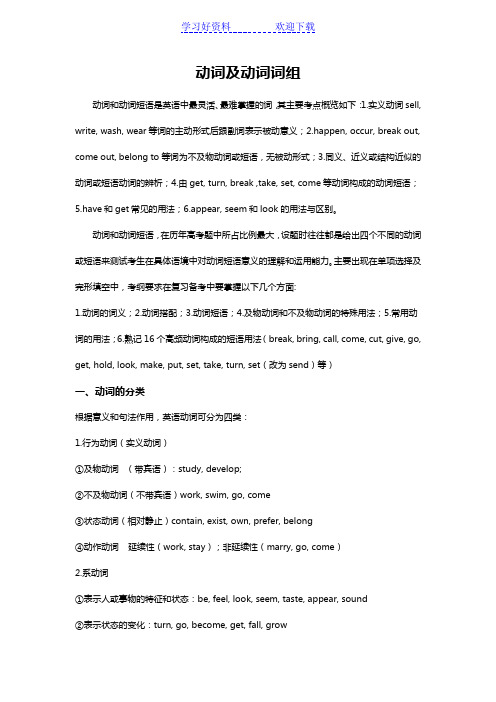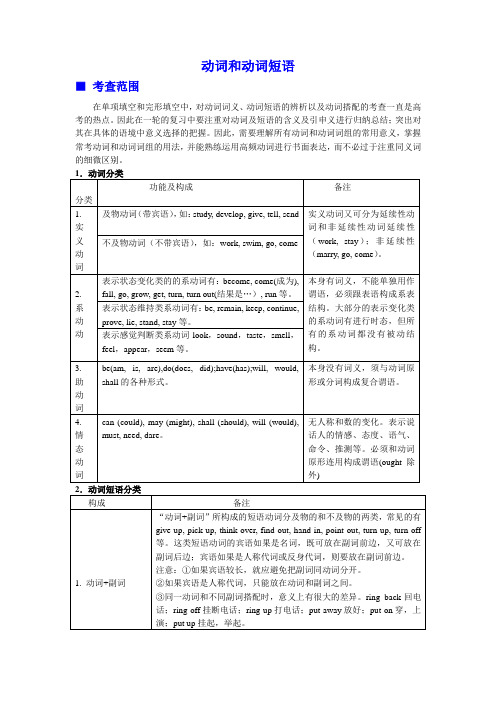动词和动词词组
动词和动词短语

动词和动词短语1.接不定式(不接动名词>作宾语的24个常用动词afford(买得起;有能力做>,agree(同意>,arrange(安排>,ask(要求;让>,beg(请求>,fail(失败>,choose(选择>,decide(决定>,demand(要求>,determine(决定>,expect(期待>,fear(害怕>,help(帮助>,hope(希望>,learn(学习>,manage(设法>,offer(提出>,plan(计划>,prepare(准备>,pretend(假装>,promise(许诺>,refuse(拒绝>,want(想要>,wish(希望>NqFaLH4sHkIt is a very important exam so I can’t afford to fail it.NqFaLH4sHk这是非常重要的考试,我不可以失败。
My neighbour offered to help me when I was in trouble.NqFaLH4sHk当我困难时,邻居主动提出帮我忙。
2.接动名词(不接不定式>作宾语的28个常用动词admit(承认>,advise(建议>,allow(允许>,appreciate(感激>,avoid(避免>,consider(考虑>,delay(推迟>,deny(否认>,dislike(不喜欢>,enjoy(喜欢>,escape(逃避>,fancy(想象>,finish(完成>,forbid(禁止>,stand(忍受>,imagine(想象>,keep(继续>,mention(提到>,mind(介意>,miss(错过>,permit(允许>,practise(练习>,prohibit(禁止>,report(报道>,risk(冒险>,stop(停止>,suggest(建议>,understand(理解>NqFaLH4sHkI really appreciate working with someone who does such a good job.NqFaLH4sHk我非常乐意与工作如此出色的人共事。
高考常见的动词词组动词词组

1. 动词+aboutcare about 对…在乎come about 发生(vi)bring about 引起,使发生hear about 听说set about doing 着手,开始做think about 思考worry about 为…担心2. 动词+ ataim at 目的是call at 拜访(地点)come atglance at 匆匆一瞥glare at 怒视laugh at 嘲笑knock at 敲(门,窗)point at 指向run at 冲向shoot at 向…射击shout at 冲某人嚷嚷smile at 冲某人微笑stare at 凝视tear at 用力撕wonder at 惊讶work at3. 动词+awayblow away 吹走carry away 拿走,使入迷clear away 消除掉,消散give away 背弃,泄漏pass away 过世put away 收拾起来;存起来take away 拿走throw away 扔掉wash away 冲走4. 动词+backcall back 回电话give back 归还hold back 控制住;踌躇;阻止…发展keep back 隐瞒;忍住;扣下(钱)look back 回顾take back 拿回,收回5. 动词+downbreak down 坏了;垮了;失灵;分解;克服(某种情绪)bring down 使…降低;使...倒下burn down 烧毁come down 下落,传下来calm down 平静下来cut down 消减;坎倒pass down 传下来settle down 安家;安静下来slow down 慢下来take down 记下tear down 拆毁,拆除turn down 调小,拒绝6. 动词+foranswer for 对…负责apply for 申请ask for 要求得到beg for 乞求call for 要求;需要change…for…用…来换charge …for…收费;要价care for 关心;喜欢hunt for 寻找hope/ wish for 希望long for 渴望look for 寻找pay for 为…付钱run for 竞选search for 查找stand for 代表,表示take… for 误以为…是…wait for 等待7. 动词+fromdate from 始于…(=date back to)differ from 与…不同die from 因…而死hear from 收到某人来信keep/ prevent/ stop …from doing阻止learn from 向…学习result from 由于separate… from 把…分离开suffer from 受…苦8. 动词+inbreak in 强行进入;插话bring in 引进;赚得call in 召集;来访cut in 插入drop in 拜访fill in 填写get in 进入;收获give in 让步,投降hand in 上交join in 参加(活动)look in 来访,参观persist in 坚持result in 导致succeed in 成功take in 吸收;理解;欺骗9. 动词+intoburst into 闯入;迸发change ….into…把…变成…divide…into…把…分成…look into 研究;调查put/ translate…into…翻译run into 碰到turn into 变成10. 动词+ofapprove of 赞成complaim of 抱怨consist of 组成die of 死于dream of 梦到hear of 听说rob sb. of 抢劫某人某物speak of 谈到talk of 谈到think of 想到11. 动词+offbreak off 打断carry off 带走cut off 切断;断绝fall off 跌落,掉下get off 脱下;下车give off 散发出go off 走开,消失,坏掉keep off 避开;勿走进knock off 把…撞落leave off 中断,停下pay off 还清put off 延期,推迟see off 送行set off 出发,上路show off 炫耀start off 出发take off 脱下;起飞;腾飞;模仿turn off 关掉;turn sb off 使某人厌烦12. 动词+onbring on 使…发展carry on 继续,进行call on 拜访call on sb to do 号召某人去做congratulation to sb on sth祝贺depend on 依靠feed on 以…为生go on 继续,进行insist on 坚持have on 穿着keep on 继续look on 旁观live on 以…为生move on 继续移动,向前走operate on 给…做手术pass on 传受,传递put on 穿上,戴上,上演rely on 依靠spend…on sth/ in doing 在某方面花钱take on 雇佣;呈现;承担(任务)try on 试穿turn/ switch on 打开work on 从事13. 动词+outbreak out 爆发bring out 阐明burst out 迸发carry out 执行come out 出来;出版;开花drop out 辍学;退出figure out 算出find out 查处give out 散发;分发;用完;劳累go out 熄灭hand out 散发help out 救助hold out 伸出;坚持下去leave out 省略,删掉let out 泄漏,发出(声音)look out 小心keep out 使…不进入make out 理解,看清楚pick out 选出point out 指出put out 扑灭run out 被用完run out of 把…用完set out 出发;开始做to dosend out 发出;派遣speak out 大胆讲出try out 使用,试验turn out 结果是;生产wear out 突破;使…疲劳work out 算出;制定;运行结果;锻炼14. 动词+overget over 克服;恢复go over 复习;审查,研究fall over 跌倒,摔倒look over 翻阅;检查roll over 翻滚run over 看一遍,压死take over 接管think over 仔细考虑turn over 翻倒;细想15. 动词+toadd to 增添add….to…把…增添到…agree to 同意attend to 照料belong to 属于come to 共计;苏醒compare …to…与…相比devote to 致力于get to 到达happen to 发生lead to 导致listen to 听object to 反对point to 指向refer to 谈到;涉及到;参阅reply to 答复see to 处理,照料stick/ hold/ keep to 坚持supply… to 为..提供turn to 查阅;向…求助write to 给某人写信16. 动词+upbreak up 分解,解散bring up 抚养build up 建立catch up with 赶上clear up 整理,收拾;放晴come up 上来;出现cut up 切碎do up 整理,包装eat up 吃完end up 结束fix up 修理;安排,装置get up 起床,站起give up 放弃,停止go up 增长,上涨grow up 成长hurry up 赶快keep up 保持hold up 耽搁,使停顿lay up 积蓄look up 查找,找出make up 组成;编造;铺(床);和好open up 开创pick up 拾起;学会;接某人;接受put up 搭起;住宿;张贴ring up 打电话send up 发射set up 架起;建立sit up 熬夜speed up 加速stay up 熬夜take up 开始做;从事;继续;占据tear up 撕碎throw up 吐turn up 调大;出席,出现use up用完17. 动词+withagree with同意begin with以…开始combine with结合compare…with…对比cover with覆盖deal with处理do with处理end with以…结束equip …with…装备fill with装满play with玩耍provide sb with sth提供provide sth for sb meet with遇到,遭受share with分享supply sb with sth提供supply sth to sb talk with和某人谈话18. 动词+throughget through通过;完成;接通电话go through审查,检查live through经历look through翻阅,仔细察看pull through渡过危机see through识破动词+名次+介词catch sight of 瞧见,看见catch/ take hold of 抓住devote oneself to 致力于do harm to 对…有危害do wrong to 冤枉,委屈feel/ have/ take pity for 同情fix one’s eyes on 凝视form the habit of 养成习惯get in touch of 联系上get rid of 去除give advice on 提出建议have trust in 相信have (no)difficulty in (没)有困难have a word with 同某人谈话have words with 和某人争吵have a look at 看have/ show/ feel/ (an)interest in对某物感兴趣have effect on 对…有影响have mercy on 同情怜悯have the honor of 有…的荣幸help oneself to自便keep in touch with 保持联系make friends with 交朋友make fun of 取笑make good/ full use of 利用make (the) best use of 充分利用make an apology to 道歉make a fool of 愚弄make one’s way to 走向make preparations for 为.. 做准备make room for 为…留地方pay a visit to 访问pay attention to 注意put one’s heart to 全神贯注于set fire to=set sth on fire 点火show respect for 尊敬say hello/ goodbye to 打招呼/道别set an example to 树立榜样shake hands with 握手take aim at 瞄准take charge of 负责管理take the side of 支持take pride in 因…而自豪take part in 参加take a photo of 照相take a message for 捎个口信take care of照顾take notice of注意take the place of代替throw light on 阐明动词+副词/形容词+介词add up to 总计为break away from 脱离,挣脱be up to 应由…轮到…cut down on 消减catch up with 赶上come up to 达到(标准)come up against 遭到(反对,困难)do well in 做得好do away with 废除drop in on/ at 拜访人/地face up to 面对,承担fit in with 适合,符合get down to 开始认真做get close to 接近get into the habit of养成习惯get used to 习惯get on/ along with 进展,相处get out of 从…出来,摆脱go on with 继续go back on 背信,背弃go in for 参加,爱好keep away from 远离keep up with 跟上live up to 不辜负look/ watch out for 小心look back upon 回顾look forward to 期待look up to 尊敬look down upon 轻视make up for 弥补put up with 忍受think highly of 高度评价work hard at 努力于动词+介词+名词arrive at/ come to aconclusion得出结论burst into pieces 成为碎片burst into laughter/ tears 突然大笑/大哭come into use 开始使用come into power 当权coem into being 产生do up one’s hair 梳理头发get in a word 插话make up one’s mind 下决心。
动词和动词词组

知识结构网状态:b e持续:keep, last ,remain ,stay, lie,stand似乎:seem,appear感官:look,smell,taste,feel,sound系动词变成:become,grow,go,get,turn,come,fall,run证明:prove,turn out1帮助现在分词构成现在进行时2帮助过去分词构成被动语态Be 3帮助不定式构成beto do结构,表示将来,命令,征求意见,约定等。
1帮助实义动词构成疑问句,否定句助动词 do 2帮助实义动词原型构成强调式3用来代替动词按用法 have帮助过去分词构成完成时态分shall/will/would/should帮助谓语动词构成将来时态宾语及物动词双宾语复合宾语实义动词不及物动词动词情态动词延续性动词:last;keep按意义分动词和非延续性动词:die,leave,come动词词组动词+介词:look at; take on动词+副词:find out ,turn up动词词组动词+副词+介词:come up with, go in for动词+名词+介词:take part in ,take care ofBe+形容词+介词:be ready for ,be devoted to 考点一:动词及动词辨析1,achieve,gain,win,earn(1),achieve,vt. 强调通过极大努力获得或达到某事物,实现弯沉,常与一些抽象名词连用,如:success,goal(2),gain vt 指获得,赢得(尤指想要的或所需的事物)。
此外,gain 还有增加的意思 I gained the impression that the matter had been settled The plane rapidly gained height. Gain weight= put on weight(3),win vt 表示在较强的竞争中取得胜利,它通常跟的宾语有game,war ,prize, fame, battle(4),earn vt. 表示挣钱,赚工资,因自己成就行为等,得到应得的事物,博得,earn one’s living 谋生2,adapt, adjust, adopt(1),adapt 使适合,使适应 adapt (oneself)to …使自己适应。
高考复习动词和动词短语

A your cell phone when 8. Terry, please _____ Grandma is talking to you. (安徽2014) A. look up from B. look into C. look back on D. look through 9. Shakespeare’s writing is still popular B the test of today. It has really _____ time. (安徽2014) A. failed B. stood C. taken D. conducted
2. 动词短语辨析。主要包括同根动词短语 的辨析、同根介词或副词的动词短语的 辨析、 不同动词构成的动词短语的辨析 以及“动词+副词+介词”短语的辨析。 在动词词组的测试中,绝大多数为基础 动词,出现频率较高的词有:get, turn, make, put, go, give, break, cut, come, look, keep, bring, show, pick, hold, fall, carry, pull, catch, call, take等。
4. As a grassroots singer, she reads everything she can _____ B concerning music, and takes every opportunity to improve herself. (福建2014) A. catch sight of B. get hold of C. take charge of D. make mention of
Ralph W. Emerson would always _____ D new ideas that occurred to him. (陕西2014) A. set off B. set about C. set up D. set down
高中英语语法-动词及动词词组

动词及动词词组动词和动词短语是英语中最灵活、最难掌握的词,其主要考点概览如下:1.实义动词sell, write, wash, wear等词的主动形式后跟副词表示被动意义;2.happen, occur, break out, come out, belong to等词为不及物动词或短语,无被动形式;3.同义、近义或结构近似的动词或短语动词的辨析;4.由get, turn, break ,take, set, come等动词构成的动词短语;5.have和get常见的用法;6.appear, seem和look的用法与区别。
动词和动词短语,在历年高考题中所占比例最大,设题时往往都是给出四个不同的动词或短语来测试考生在具体语境中对动词短语意义的理解和运用能力。
主要出现在单项选择及完形填空中,考纲要求在复习备考中要掌握以下几个方面:1.动词的词义;2.动词搭配;3.动词短语;4.及物动词和不及物动词的特殊用法;5.常用动词的用法;6.熟记16个高频动词构成的短语用法(break, bring, call, come, cut, give, go, get, hold, look, make, put, set, take, turn, set(改为send)等)一、动词的分类根据意义和句法作用,英语动词可分为四类:1.行为动词(实义动词)①及物动词(带宾语):study, develop;②不及物动词(不带宾语)work, swim, go, come③状态动词(相对静止)contain, exist, own, prefer, belong④动作动词延续性(work, stay);非延续性(marry, go, come)2.系动词①表示人或事物的特征和状态:be, feel, look, seem, taste, appear, sound②表示状态的变化:turn, go, become, get, fall, grow③表示某种状态的延续或持续:remain, keep, stay3.助动词(与动词原形或分词构成复合谓语):be(am,is,are),do(does,did);have(has);will,would,shall4.情态动词:can(could),may(might),must,shall(should)二、动词及动词短语(一)动词词义辨析动词是是各类考试的重点,高考试题中,单项填空、完形填空和改错等三项题型中,动词辨义的比重较大,并逐年增加。
中学历史常见动词及动词词组

中学历史常见动词及动词词组
本文档旨在介绍中学历史学科中常见的动词及动词词组,供学生们参考和研究。
1. 描述历史事件和过程的动词:
- 发生:某事件在某时间和地点发生。
例:法国大革命发生在1789年。
- 影响:某事件对其他事物产生作用。
例:工业革命对社会经济产生了深远的影响。
- 引起:某事件导致了其他后续事件的发生。
例:第一次世界大战引起了第二次世界大战的爆发。
2. 分析历史原因和结果的动词词组:
- 导致:某个因素导致了特定的结果。
例:经济不景气导致了社会不满情绪的增加。
- 因此/因此而:表示由于某个因素,产生了特定的结果。
例:工商业的发展带动了城市人口的增长,因此而出现了城市化现象。
- 带来:某个因素带来了某些后果。
例:环境污染带来了严重的生态问题。
3. 表达历史观点和评价的动词词组:
- 认为:表示个人或学者对某个历史事件或问题的看法。
例:历史学家认为罗马帝国的衰败有许多原因。
- 强调:对某个观点或事实进行特别的强调。
例:我们应该强调文化因素在历史发展中的重要性。
- 反映:某个事物或现象反映出特定的历史背景或状态。
例:古代建筑反映了当时的社会文化水平。
请注意,以上只是一些中学历史中常见的动词及动词词组,不包括全部内容。
在写作时,可以根据具体的历史事件和要表达的观点选择适当的动词表达。
动词和动词词组 ppt课件

My wife doesn’t know Russian
Do you agree with me?
2.do用来加强语气,起强调作用 You do look well
3.do用作代词 ---Do you like Beijing? ---Yes,I do (do代替like Beijing)
Examples: 1. It may snow before nightfall.
2. Would you let me use your pen for a minute?
3.If she became a movie star, she could afford a new home.
注意:情态动词过去时形式并不一定就表示过去时间 情态动词不能叠加使用,其后接的是动词原形
第10讲
动词和动词词组
动词分类(一)
1,按其在动词词组中所起的作用分:主动词和助动词
{主动词: 又叫实义动词,能独立作句子谓语成分 简单动词词组 复杂动词词组 基本助动词:be,do,have
{ 助动词
情态助动词 can,could,may,might,will,would,shall,should,need, must,dare,dared,ought to,used to
半助动词:have to,seem to,be about to,be due to, be going to ,be meant to,be meant to,be supposed to等.
Examples: 1.The workers received a raise last year.
2.They have been taking music lessons.
高考英语词法系列:动词和动词短语

动词和动词短语■考查范围在单项填空和完形填空中,对动词词义、动词短语的辨析以及动词搭配的考查一直是高考的热点。
因此在一轮的复习中要注重对动词及短语的含义及引申义进行归纳总结;突出对其在具体的语境中意义选择的把握。
因此,需要理解所有动词和动词词组的常用意义,掌握常考动词和动词词组的用法,并能熟练运用高频动词进行书面表达,而不必过于注重同义词的细微区别。
■高频考点高考对动词的考查重点集中在实义动词的常见意义和用法,而对助动词的考查较少。
对动词短语的考查重点是第1~3项,而考查第4~6项的情况较少。
高考试题分析■真题探究1.(2010安徽)No matter how low you consider yourself, there is always someone ______you wishing they were that highA. getting rid ofB. getting along withC. Looking up toD. looking down upon【答案与解析】C getting rid of意为“摆脱;去除”;getting along with意为“与……相处;进展”;Looking up to意为“尊敬;敬仰”;looking down upon意为“看不起;轻视”。
句意为“你无论认为自己怎样低下, 总希望有个高尚的人来尊敬你。
”2. (2010全国Ⅰ)The workers ______ the glasses and marked on each box “ This Side Up”A. carriedB. deliveredC. pressedD. packed【答案与解析】D 句意:工人们把玻璃制品包装好并且每个盒子上标记上“此面向上”。
选项为四个意思上毫无关联的动词, 此题考查动词的词义辨析。
carry 译为搬运, deliver译为递送, press译为按, 压, pack译为打包。
- 1、下载文档前请自行甄别文档内容的完整性,平台不提供额外的编辑、内容补充、找答案等附加服务。
- 2、"仅部分预览"的文档,不可在线预览部分如存在完整性等问题,可反馈申请退款(可完整预览的文档不适用该条件!)。
- 3、如文档侵犯您的权益,请联系客服反馈,我们会尽快为您处理(人工客服工作时间:9:00-18:30)。
一,基本助动词
be 1. be通常用来协助主动词构成进行体和被动态 I am listening to a Beethoven symphony
The students were praised by the principle
Example 1.The fish is fresh from water.You don’t have to smell it 2.The milk is going bad.It smells 3.This dish smells delicious
3,按词汇意义分:动态动词,静态动词 一,动态动词
第10讲
动词和动词词组
动词分类(一)
1,按其在动词词组中所起的作用分:主动词和助动词
主动词: 又叫实义动词,能独立作句子谓语成分 简单动词词组 复杂动词词组 基本助动词:be,do,have
{
助动词
{
情态助动词 can,could,may,might,will,would,shall,should,need, must,dare,dared,ought to,used to
The new lamp gave us more light
2.有些及物动词在一定上下文中既要带宾语,也要带状 语
I put the book on the shelf
二,不及物动词
1.不及物动词之后不带宾语,但有些不及物动词在一定上下 文中须带状语,否则意义完全不同
Example 1.The president is speaking
补充:(4)AAB beat (5)ABA become come run
beat
beaten
became came ran
become come run
•Verb's grammatical forms: •Tense(时):it is the verb form that shows time distinction. •Aspect(体):it is the verb form that shows motion or process is in what state in a certain time. •Voice(态):it is the verb form that shows active or passive relationship between subjects and predicate verbs. •Mood(式):it is the verb form that is used to distinguish speakers in what tone of voice. •Tense(时):过去时 现在时 将来时 •Aspect(体): •Progressive Aspect进行体 •Perfective Aspect完成体
Examples: 1.I have to buy a new car. 2. You will have to sell your house.
2.按是否须跟有补足成分以及须跟什么样的补足成分分
{
及物动词 不及物动词 连系动词
一,及物动词 1. 及物动词后须带宾语,有些可带双宾语,
John is playing cricket
表示肉体感觉的动词,如ache, feel ,hurt等,用于进行体或非进行体均 可,含义不变。 Examples: 1.My foot aches/ is aching. 2.I don't feel/ am not feeling very tired.
动词分类(二)
一,单词词组和动词词组
词组动词
She doesn't hear very well. 4.表示心理或情感状态的动词,如assume, believe, consider, detest等 We understood your difficulty.
注意:
如果静态动词(stative verb)用于进行体(progressive aspect),则变为动 态动词(dynamic verb). Examples: =is acting foolishly 1.He is being foolish. =is bringing great injury to us 2.This mistake is costing us dearly. 3.Be quiet. I'm thinking. =giving thought to a problem
(2)AAA cast cast cast hit hit hit put put put set set set spread spread spread 此外还有cut,fit,hurt,let,read,cost,shut等
(3)ABB bend bent bent creep crept crept deal dealt dealt flee fled fled mean meant meant dig,catch,hang,hold,find,sit,pay,win,meet,feel等同此用法
表持续动作的词 例:drink, eat, fly, play,rain,read,run,sit等 表改变或移动的词 例:arrive, become, change, come,get,go,leave 表短暂动作的词 例:hit, jump, kick, open, close,put,shut,knock等
二,限定动词和非限定动词
{
限定动词
限定形式
非限定动词
非限定形式
{ {
现在时 过去时 不定式 现在分词 过去分词
三,规则动词和不规则动词 大多数动词的过去时和过去分词都是在原形之后加词尾-ed构 成,这类动词叫规则动词,其他则归为不规则动词 不规则动词的几种类型: (1)ABC(即原形,过去时,过去分词) arise arose arisen break broke broken ring ran run steal stole stolen begin began begun
半助动词:have to,seem to,be about to,be due to, be going to ,be meant to,be meant to,be supposed to等.
Examples: 1.The workers received a raise last year.
2.They have been taking music lessons.
{
Examples:
1.He works at a chemical factory.
表持续动作 表持续动作 表改变 表短暂动作
2.They were talking about the house.
3.Winter is here. The leaves of the trees are turning yellow. 4.The old man stops at a house and knocks at the door.
do 1. do通常用来协助主动词表示否定意义或构成疑问句 My wife doesn’t know Russian Do you agree with me?
2.do用来加强语气,起强调作用
You do look well 3.do用作代词
---Do you like Beijing?
---Yes,I do (do代替like Beijing) 4.构成否定祈使句时,只用do,而不用does 和did Don’t be so absent-minded
二,静态动词 1.用作主动词的be和have(作“有”解): We have friends all over the world. 2.含有静态动词be,have意义的动词,如apply to, belong to, differ from, cost, weigh等。
This rule applies to (=is applicable to)everyone. 3.表示感觉的动词, 如feel, hear, see, smell等
5.do用作实义动词,译为“做”
Jane was doing the dishes when her mother came back
have
1.have通常用来协调主动词构成完成体或完成进行体 Joan has seen that movie I have been working here for 20 years
Examples: 1.He couldn't account for his long absence from school. 2.The place blow up when it was hit by a missile. 3.I don't want to come down with the flu again.
•Examples:
•I speak Chinese, but now I am speaking English.
•2.I have taught English for 20 years.
•Voice(语态):
{
•Active Voice主动态•→Active Sentence主动句
2.Frank cheats at poker
三,连系动词
1.连系动词之后带主语补语
Example
1.That sound like a good idea
2.The fish smells awful
补充:(1)状态系动词:be (2)持续系动词:keep,remain,stay,rest,lie,stand等 (3)表象系动词:seem,appear,look等 (4)感官系动词:fell,smell,sound,taste等 (5)变化系动词:become,grow,turn,fall,get,go, come,run 等 (6)终止系动词:prove,turn out等 注意:有一些动词具有跨类现象,既能作及物动词,也能作不及物 动词和联系动词,常见的有smell,become,prove,taste,stay
